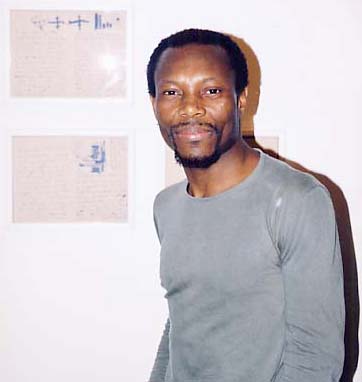Monuments to the Precarity of Survival
Olu Oguibe’s (Faculty Berlin ’18) first solo exhibition in Austria presents a tripartite of monumental and commemorative works produced since 2000.
The exhibition Olu Oguibe was part of the annual “Curated By” gallery festival in Vienna, curated by Bonaventure Soh Bejeng Ndikung (Faculty Berlin ’19 and ’20).

With this eponymous exhibition, painter, sculptor, conceptual, artist, poet, curator, scholar and art critic, Olu Oguibe, was hosted by Galerie Kandlhofer. The monumental works are monumental not only because of their importance or aesthetic brilliance, their conspicuousness to posterity, but also monumental because with these works. Oguibe has crafted spaces, forms and ideas that in themselves serve as memorials of particular events, moments, histories or occurrences within world history. Such incisive moments and realities we cannot afford to overlook nor forget, and neither can we afford to wait for some institutions to raise ‘official’ monuments for their remembrance.
The sadness descends again
Sodden like a sheet of ice
Yet, somehow through the shawl
A smile, stubborn as a thumb
Pries its way to life
A cotyledon of light
Defies the night.– Olu Oguibe, “The Sadness Descends Again”

New Monuments Series
The show includes works from 2000 to 2020. Many of these address the monument, dislodging deep-seated ideas about its commemorative and aesthetic functions, as well as questions of site and scale. Several pieces reveal Oguibe’s fascination with typography. For New Monuments Series (2020), he painted by hand, in English and Italian, the same phrase from the Gospel of Matthew. Dedicated to Mimmo Lucano, mayor of the southern Italian town of Riace, and aid worker Scott Warren – both of whom stand out for their hospitality to migrants at the height of refugee arrivals to Europe’s borders in 2016 – the work plays into ongoing debates on monuments by honouring humanitarian (anti)heroes.

New York, April 2020
In Vienna, Oguibe’s installation New York, April 2020 (2020) – consisting of three tiers of wooden shelves supporting mannequins wrapped in white cloth – calls to mind the high death toll of the pandemic in New York by re-creating a makeshift mortuary. Considering that more people have died from COVID-19 in the US than on the entire African continent, Oguibe’s direct juxtaposition of two health crises highlights both the historicity of pandemic politics and the cataclysm of the present.
The COVID-19 pandemic might give a sense of the fear and anxiety that South Africans experienced in the 1990s. However, as the world races to develop a vaccine, there is legitimate concern about similar problems of global accessibility.

Information
Olu Oguibe: 8 – 26 September 2020
Galerie Kandlhofer
Vienna, Austria.
Thank you to Freize, Galerie Kandlhofer, and Eric Otieno for the information.
See the exhibition online here.
About Olu Oguibe

Olu Oguibe’s poem “Conversation,” excerpted above, engages an imaginary individual on the meaning of personhood, nation, wanderlust, and eternal damnation. Over a multidimensional art career that spans nearly three decades, Oguibe, born in Nigeria in 1964, intersects the personal with the collective in his writings and paintings; he creates poignant narratives of which the human condition is the central leitmotif. He acts as a seer, a troubled recluse, or a confident bohemian at home in a perilous world. (via. Documenta)